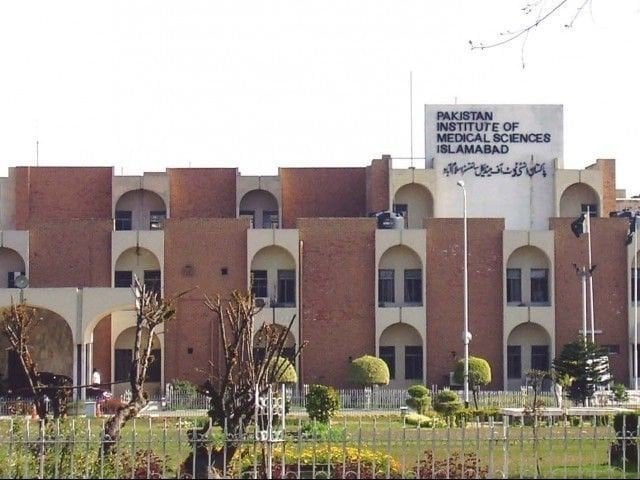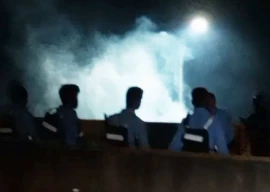
A sub-committee was also formed to take up in detail issues such as waste management, hospital waste management, the situation of storm drains and encroachment in the Islamabad Capital Territory (ICT).
This was directed in a meeting of the Senate Standing Committee on Climate Change on Monday. The meeting was chaired by Awami National Party (ANP) Senator Sitara Ayaz. The committee mulled over the cleanliness of the storm drains (nullah), hospital waste management, water and air pollution in the federal capital.
Holistic approach needed over environment, SC told
Cleaning drains
The issue of cleaning of storm drains (nullahs) and removing encroachment were discussed at length. The committee was told that the Islamabad Metropolitan Corporation (IMC) is in process of removing encroachment which will be followed by regularisation and standardisation of kiosks to make them aesthetically appealing.
The committee reiterated that while the anti-encroachment drive is important, it should not become anti-poor and care should be taken so that it does not fall prey to corruption during the regularisation process.
The Senate panel decided to constitute a sub-committee to take up in detail the waste and other environmental issues of the capital. The sub-committee will be headed by Senator Mushahid Hussain Sayed and include Senators Barrister Ali Saif and Senator Keshoo Bai.
No incinerators
Pakistan Environment Protection Agency (Pak-EPA) Director General (DG) Farzana Altaf Shah briefed the committee on the environmental issues of the city and mitigation measures adopted by the environmental watchdog.
Altaf told members of the committee that there was no authority in the federal capital which regulated hospitals and healthcare facilities as opposed to the health commissions in Punjab which carried out this function across the province.
Members of the committee expressed their surprise at learning that there is no regulatory framework in place regarding hospital waste management in the federal capital.
"There are as many as 80 health facilities, including hospitals and other medical centres, identified by the PAK-EPA [in the federal capital],” Altaf told the committee, adding that since no one had consolidated data, the agency had to carry out its own survey to identify the total number of health facilities in the city.
Moreover, the Pak-EPA chief added that most of this data had been collected and managed by internees.
Per their data, Altaf said that they had identified the Pakistan Institute of Medical Sciences (Pims) as the largest producer of hospital waste — ostensibly because it was the largest tertiary care hospital in the city.
The hospital, though, does not have an incinerator but it has started the process of installing one following the directive from the Supreme Court and notices from the Pak-EPA.
The agency further said that they had issued notices to 54 of these health facilities while eight of them were issued Environment Protection Orders (EPO). Orders were directed to comply with the Hospital Waste Management Rules 2005, including a military hospital operating in Sector E-9.
The Pak-EPA chief was not in favour of allowing each of the 80 health facilities to develop their own incineration facilities. Instead, she proposed setting up a centralised incinerator in the federal capital.
“The burning process usually begins below 1,200°C or in close proximity as heat at or over 1,200°C produces carcinogenic emissions whereas the combustion activity is conducted below 1,200°C,” Altaf explained.
Poor air quality
Talking about air pollution in the federal capital, the Pak-EPA chief said that one major cause of poor air quality was the emissions from a large number of vehicles on the capital’s roads.
An independent air quality monitor for the capital showed that on Monday particulate matter concentrations were usually lower during the day, remaining between 60 microgrammes per metre cube to 100µg/m³. It rose to a peak of 131µg/m³ by mid-afternoon as the evening rush of vehicles started and remained over 100µg/m³ until late in the evening.
With industries and brick kilns blamed for air pollution in the past, Altaf noted that there are eight steel furnaces in the industrial zone whose emissions have been monitored online through air quality monitors and cameras installed at the plants. Data from these monitors is regularly maintained and updated, she said.
The committee, while appreciating the Pak-EPA’s efforts, noted that one department alone cannot manage the environmental issues though there was a need to strengthen the environmental watchdog.
Senator Ayaz, though, raised concerns over lack of coordination between the Capital Development Authority (CDA) and the Pak-EPA on various environmental issues.
At this, the CDA chairman immediately offered his assistance to the Pak-EPA and proposed to coordinate with the watchdog on environmental issues — particularly identifying a site for setting up a hospital waste incineration and dump in the city — as soon as the committee’s meeting ended.
COP-24
Senator Sherry Rehman expressed concerns over the preparations of the country during its participation in the 24th conference of parties (COP-24) under United Nations Framework Convention on Climate Change (UNFCCC) in Poland where 190 countries are expected to participate.
She said that various carbon diplomats have informed her and other committee members that Pakistan had a weak case prepared to be presented at the conference. India, on the other hand, had prepared a very strong plan to unveil in the global climate moot.
Published in The Express Tribune, December 4th, 2018.


1729080111-0/BeFunky-collage-(63)1729080111-0-165x106.webp)
1730838202-0/Trump-(1)1730838202-0-165x106.webp)













COMMENTS
Comments are moderated and generally will be posted if they are on-topic and not abusive.
For more information, please see our Comments FAQ